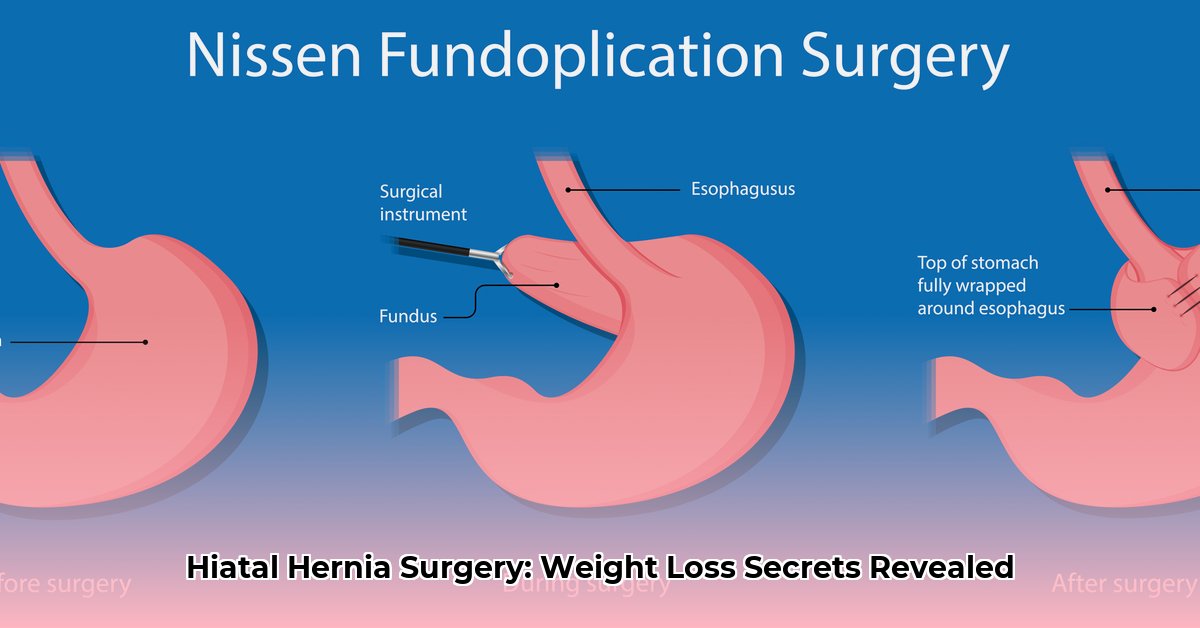
Understanding Weight Changes After Hiatal Hernia Surgery
Having hiatal hernia surgery (a procedure to repair a condition where part of your stomach pushes up into your chest) often raises questions about potential weight changes. This guide will explain the common reasons for weight fluctuations after surgery and provide actionable steps for managing your weight effectively.
Expected Weight Changes Post-Surgery
Weight changes are common after hiatal hernia surgery, but the extent and duration vary significantly. Initial weight loss often stems from the post-operative liquid diet, which restricts calorie intake. The surgery itself may slightly reduce stomach capacity in some individuals, leading to earlier feelings of fullness and potentially sustained weight loss. However, significant or rapid weight loss (more than 2 pounds per week) requires immediate medical attention. Don't hesitate to contact your healthcare provider if you experience this.
"It's crucial to remember that each patient's experience is unique," says Dr. Anya Sharma, MD, FACS, Surgical Oncology at University Hospital. "While some experience weight loss, others may not see significant changes. Regular monitoring and open communication with your surgeon are critical."
Factors Influencing Post-Surgical Weight
Several factors influence post-surgical weight:
- Pre-operative weight: Individuals who were overweight or obese before surgery may experience more significant initial weight loss.
- Surgical technique: Laparoscopic (minimally invasive) surgery generally leads to quicker recovery and less disruption to eating habits compared to open surgery.
- Concurrent procedures: Undergoing bariatric surgery (weight-loss surgery) alongside hiatal hernia repair will significantly impact long-term weight.
- Individual metabolism: Metabolic rate and individual response to surgery vary.
However, it's crucial to understand that there's no conclusive data on the exact amount or duration of weight changes after hiatal hernia surgery.
Post-Operative Dietary Guidelines: A Step-by-Step Plan
Following your doctor's dietary recommendations is vital for a successful recovery and weight management. Here's a general guideline:
- Liquid Phase (Days 1-3): Clear liquids like broth, water, and diluted juices. This stage prioritizes rest for your digestive system.
- Pureed Foods (Days 4-7): Gradually introduce pureed foods like applesauce, smooth soups, and well-blended vegetables. Focus on easy digestion.
- Soft Foods (Weeks 2-4): Transition to soft foods such as scrambled eggs, cooked vegetables, and well-cooked pasta. Avoid chewy or crunchy foods.
- Full Diet (After 4 weeks): With your surgeon's approval, gradually reintroduce a wider range of foods, emphasizing small portions and whole foods. This is a gradual process, not a sudden return to old habits.
Remember: This is a general guide. Your doctor will create a personalized plan based on your individual needs and recovery progress.
Long-Term Weight Management: A Lifestyle Commitment
Maintaining a healthy weight before and after surgery is crucial for preventing hernia recurrence and promoting overall well-being. This requires a long-term commitment to healthy habits:
- Balanced Diet: Focus on nutrient-rich, whole foods.
- Regular Exercise: Aim for at least 30 minutes of moderate-intensity exercise most days of the week (consult your doctor before starting any new exercise program).
- Stress Management: Stress can affect eating habits and overall health. Find healthy ways to manage stress, such as meditation, yoga, or spending time in nature.
Monitoring Weight Changes: When to Contact Your Doctor
Regularly monitor your weight, but don't obsess over minor fluctuations. However, contact your doctor immediately if you experience rapid or significant weight loss (more than 2 pounds per week), persistent nausea, vomiting, or other concerning symptoms. Prompt attention is crucial for addressing any underlying issues.
Risk Assessment and Mitigation
Understanding potential risks and mitigation strategies helps prepare you for a smoother recovery:
| Potential Problem | Likelihood | Severity | Mitigation Strategy |
|---|---|---|---|
| Rapid weight loss | Moderate | High | Close medical monitoring, dietary adjustments, address underlying concerns. |
| Nutritional deficiencies | Moderate | Moderate | Careful dietary planning, vitamin supplements as advised by physician. |
| Complications from surgical technique | Low | High | Choosing an experienced surgeon and appropriate technique. |
Conclusion: Your Journey to Recovery
Recovering from hiatal hernia surgery and managing your weight is a collaborative effort. Maintain open communication with your surgical team, follow their dietary guidelines, and adopt healthy lifestyle choices. By proactively addressing potential challenges and focusing on long-term well-being, you can navigate this phase of your health journey successfully.